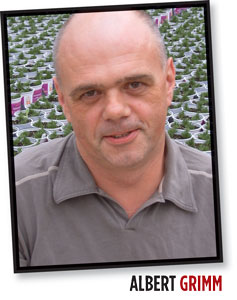1/26/2011
Growers Talk Production: Hands-On Greenhouse Experience
Albert Grimm

When you read through greenhouse job postings, you may notice how many employers ask for “hands-on experience.” Did you ever wonder why that is? What does “hands-on” really mean?
Sure, in horticulture we produce something tangible. There exists hardly a greenhouse that does not involve at least some manipulation of plants. Still, hands-on experience seems a very elusive quality, even if it is in much demand. Could it be that we have a hard time finding hands-on experience merely because we can’t describe exactly what we’re looking for?
I’ll offer you two distinct definitions of “hands-on” and you can let me know whether you agree.
If you work long enough as a supervisor in a greenhouse you’ll have heard complaints about “dumb jobs”—seemingly mundane and repetitive tasks, such as pinching, spacing, planting or weeding. Whenever I get such comments, I try to spend a little time with the people assigned to such boredom, and I make an effort to show them how even the simplest of tasks can be turned into a learning experience—be it for hand-eye coordination, micro-ergonomics, or ambidexterity. And it’s not without some pride, when during these mini lectures, I have an opportunity to show that I can still perform most of these “simple” jobs faster and with more accuracy than anybody without my experience.
There are many such manual micro skills, and they’re all unique and even competitive, because they allow us to improve the outcome of our production systems. You won’t find this type of skill described in any book because you can only learn them, well, “hands-on.” It’s also not merely experience that will generate these skills, which is evidenced by the large number of people spending their days on “dumb jobs” while a large number of help-wanted ads seek to find a remedy. We can only learn these skills from dedicated teachers willing to pass them on to the next generation. Such is the purpose of apprenticeships. I was very fortunate that I had the luck to find a few good teachers over the years, but where could a young greenhouse worker apprentice these days?
There exists yet another type of hands-on experience, which is also not taught in classrooms. Academic schooling teaches us how to think analytically and how to deduct solutions to problems from applying knowledge and thought. Academic learning doesn’t teach us how to avoid errors in judgment or unforeseen pitfalls or how to deal with the occasional professional disaster. Sound professional judgment is something we can only learn through experience or by making mistakes, which we then try to avoid doing again in the future. When greenhouses operators look for growers with hands-on experience, they’re usually looking for someone who’s done enough damage to have amassed a long list of possible mistakes in their personal “don’t-do-that-again” reference library.
The dilemma is that we have to first make mistakes before we can learn from them. How many companies are willing to give a junior grower enough room to see what happens when a crop is neglected or misjudged? Unless we can find ways to make this room for learning by error (without losing a lot of money), we will continue to look for these elusive hands-on qualities in growers. The available candidates might have experience on how to grow a good crop, but they might not know how to avoid destroying one.
I genuinely sympathize with graduating high school students today, who face the dilemma of having to find a balance between student loans and expectations for a rewarding career. I didn’t have that choice because my family wasn’t rich. Student loans were not really an option in the ’70s, and university education was out of the question. My dream career in particle physics didn’t happen. So I did the next best thing—I worked and apprenticed in a greenhouse. In the end, things didn’t turn out that bad. I wonder whether our industry could offer more high school students with an interest in science some viable opportunities to escape this academic department trap in the same “hands-on” manner.
GT
Albert Grimm is head grower for Jeffery’s Greenhouses in St. Catharines, Ontario, Canada.